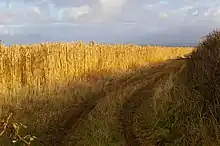biomass
English
WOTD – 3 March 2023
Etymology

A field of elephant grass or giant miscanthus (Miscanthus × giganteus) in Parkham in Devon, England, United Kingdom, which is grown as biomass (sense 2).
From bio- (prefix denoting organic life) + mass (“matter, material”).[1]
Pronunciation
- (Received Pronunciation) IPA(key): /ˈbaɪə(ʊ)mæs/
- (General American) IPA(key): /ˈbaɪoʊˌmæs/
Audio (Southern England) (file) - Hyphenation: bi‧o‧mass
Audio (US) (file)
Noun
biomass (usually uncountable, plural biomasses)
- (biology)
- The total mass of a living thing or a part thereof (such as a cell).
- 2005, David A. Guertin, David M. Sabatini, “Cell Size Control”, in Encyclopedia of Life Sciences, volume IV, Chichester, West Sussex: John Wiley & Sons, , →ISBN:
- Since protein constitutes the majority of the biomass of a cell, building new protein is a major way that cells increase their size.
- The total mass of all, or a specified category of, living things within a specific area, habitat, etc.
- 2012 August 2, Theo Tait, “Don’t Wear Yum-yum Yellow [review of Demon Fish: Travels through the Hidden World of Sharks (2012) by Juliet Eilperin]”, in London Review of Books, volume 34, number 15, London: LRB Ltd., →ISSN, →OCLC, archived from the original on 2022-12-04:
- In the untouched Shangri-la-like Kingman Reef in the Line Islands in the central Pacific, sharks make up 75 per cent of the fish biomass.
- The total mass of a living thing or a part thereof (such as a cell).
- Organic matter from living things which were recently alive (especially vegetation) used as a fuel or source of energy, especially if cultivated for that purpose; also, fuel produced from such organic matter; biofuel.
- 1994, Robert Williams, “Roles for Biomass Energy in Sustainable Development”, in R[obert Harry] Socolow, C. Andrews, F. Berkhout, V. Thomas, editors, Industrial Ecology and Global Change, Cambridge, Cambridgeshire, New York, N.Y.: Cambridge University Press, published 1997, →ISBN, abstract, page 199:
- Advanced technologies such as gasifier/gas turbine systems for electric power generation and fuel cells for transportation make it possible for biomass to provide a substantial share of world energy in the decades ahead, at competitive costs.
- 2020 April 22, Paul Stephen, “COVID-19: Meet the Railway Heroes”, in Rail, Peterborough, Cambridgeshire: Bauer Media, →ISSN, →OCLC, page 41:
- Among the key contracts she works on is the supply of coal and biomass to Drax power station and extensive rail operations for British Steel.
- 2020 August 26, Andrew Mourant, “Reinforced against Future Flooding”, in Rail, Peterborough, Cambridgeshire: Bauer Media, →ISSN, →OCLC, pages 60–61:
- All vegetation and tree stumps were sent to a local recycling facility to be turned into biomass.
Hyponyms
- phytobiomass
- zoobiomass
Derived terms
- nonbiomass
- phytobiomass
- zoobiomass
Related terms
Translations
total mass of a living thing or a part thereof
total mass of all, or a specified category of, living things within a specific area, habitat, etc.
|
organic matter from living things which were recently alive used as a fuel or source of energy
|
fuel produced from such organic matter — see biofuel
References
- “biomass, n.”, in OED Online
 , Oxford, Oxfordshire: Oxford University Press, December 2021; “biomass, n.”, in Lexico, Dictionary.com; Oxford University Press, 2019–2022.
, Oxford, Oxfordshire: Oxford University Press, December 2021; “biomass, n.”, in Lexico, Dictionary.com; Oxford University Press, 2019–2022.
Further reading
 biomass (ecology) on Wikipedia.Wikipedia
biomass (ecology) on Wikipedia.Wikipedia  biomass (energy) on Wikipedia.Wikipedia
biomass (energy) on Wikipedia.Wikipedia  biomass (disambiguation) on Wikipedia.Wikipedia
biomass (disambiguation) on Wikipedia.Wikipedia
This article is issued from Wiktionary. The text is licensed under Creative Commons - Attribution - Sharealike. Additional terms may apply for the media files.